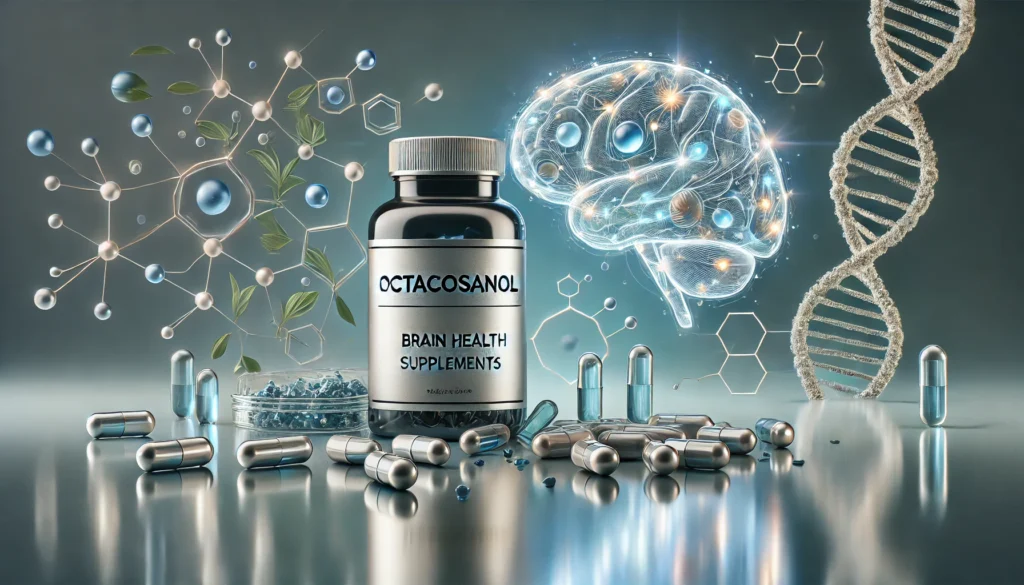Octacosanol is a naturally occurring compound often found in the waxy coatings of plants such as wheat germ oil, sugar cane, and rice bran. Known for its potential to enhance physical performance, octacosanol has recently gained attention in the wellness and scientific communities for its possible nootropic properties. This article provides a comprehensive analysis of octacosanol, delving into its sources, chemistry, physiological mechanisms, potential nootropic effects, dosage guidelines, side effects, interactions, and other essential considerations for safe supplementation.
You May Also Like:
Octacosanol: Potential Nootropic Benefits, Dosage, Side Effects, Interactions and Other Important Information About This Supplement is an original (NootropicsPlanet) article.
Sources of Octacosanol
Octacosanol is primarily sourced from plant-based oils and waxes. The richest sources include:
- Wheat Germ Oil: One of the most concentrated sources, wheat germ oil contains high levels of octacosanol, along with other beneficial nutrients.
- Sugar Cane Wax: Extracted from sugar cane, this wax is another potent source of octacosanol and is commonly used in supplements.
- Rice Bran Oil: Known for its health benefits, rice bran oil also offers moderate levels of octacosanol.
- Other Sources: Other natural sources include spinach, peanut oil, and beeswax, though these contain lower amounts.
The concentration of octacosanol in foods varies, and while it is possible to obtain octacosanol through dietary sources, supplementation may be necessary to achieve therapeutic levels for cognitive and physical benefits.

Chemistry of Octacosanol
Chemically, octacosanol is a long-chain fatty alcohol with the formula C28H58O. It belongs to a class of compounds known as policosanols, which are straight-chain primary alcohols found in plants. Octacosanol’s structure consists of 28 carbon atoms, giving it a high molecular weight and lipid solubility. This lipid-soluble property allows it to integrate into cellular membranes, which is crucial for its bioactivity and transport within the body.
Once ingested, octacosanol undergoes metabolic processes that allow it to influence various physiological pathways. It is thought to impact lipid metabolism and cellular energy production, particularly within muscle and neuronal cells, where energy demand is high. Its lipid affinity enables it to cross the blood-brain barrier, which may underlie its effects on cognitive function.
Physiological Mechanisms of Octacosanol in the Body and Brain
Octacosanol’s effects on the body are multifaceted, involving both physical and mental enhancements. Its primary mechanisms include:
- Improved Energy Metabolism: Octacosanol has been shown to influence energy metabolism by increasing the efficiency of ATP production. ATP (adenosine triphosphate) is the primary energy currency in cells, essential for muscle contractions, neuronal signaling, and cellular repair. Studies suggest that octacosanol stimulates mitochondrial activity, which supports sustained energy release in both muscular and neural tissues.
- Enhanced Oxygen Utilization: By promoting oxygen utilization, octacosanol may improve endurance and delay fatigue. This is particularly beneficial for individuals under physical or cognitive stress, where efficient oxygen use is critical. Enhanced oxygenation may also support cognitive clarity, focus, and memory retention.
- Antioxidant Activity: As an antioxidant, octacosanol helps protect cells from oxidative damage by neutralizing free radicals, particularly in high-demand tissues such as the brain and muscles. This antioxidant property is vital for preventing neurodegeneration and cognitive decline.
- Neuroprotective Effects: Recent studies have indicated that octacosanol may support neurological health through its ability to reduce oxidative stress and inflammation, both of which are linked to cognitive decline and neurodegenerative disorders. Additionally, by modulating neurotransmitter activity, octacosanol may support mental sharpness, focus, and memory consolidation.

Nootropic Benefits of Octacosanol
Octacosanol’s potential as a nootropic supplement is based on its role in enhancing energy metabolism, oxygen utilization, and antioxidant defense. While more research is needed, several specific cognitive benefits have been proposed:
- Enhanced Cognitive Stamina: Octacosanol’s effect on energy production and oxygen utilization may lead to improved cognitive stamina, allowing individuals to maintain mental focus and alertness for longer periods. This is particularly relevant for students, professionals, and others with high cognitive demands.
- Memory Support and Learning: By supporting mitochondrial efficiency and reducing oxidative stress, octacosanol may play a role in memory consolidation and learning processes. Some preliminary research suggests that octacosanol could enhance memory retention, though further studies are needed to confirm these findings.
- Mood Regulation: Octacosanol’s impact on neurotransmitter activity may support mood stabilization and reduce symptoms of anxiety and stress, potentially aiding in cognitive performance under stressful conditions. Its mild anxiolytic effects can promote a calm mental state, enhancing focus and productivity.
- Neuroprotection Against Age-Related Decline: Due to its antioxidant properties, octacosanol may protect against age-related cognitive decline by limiting oxidative damage to neurons. As oxidative stress is a known contributor to conditions such as Alzheimer’s and Parkinson’s, octacosanol’s role in reducing cellular damage may offer neuroprotective benefits.

Dosage and Supplementation Guidelines
While there is no official recommended daily intake for octacosanol, research and clinical studies provide some general guidelines:
- General Cognitive Enhancement Dosage: For those seeking cognitive support, doses ranging from 5 to 10 mg per day may be beneficial. This dose is generally safe for most individuals and aligns with levels used in preliminary studies on cognitive effects.
- Athletic Performance and Endurance Dosage: For physical endurance and performance, doses of up to 20 mg per day are often recommended. This dosage may enhance oxygen utilization and ATP production, providing sustained energy for both mental and physical activities.
- Supplement Forms: Octacosanol is available in various forms, including capsules, tablets, and soft gels. Many individuals prefer supplements derived from wheat germ oil or sugar cane wax due to their high octacosanol concentration and additional nutrient benefits.
- Timing and Absorption: Octacosanol is best taken with a meal that contains fat, as its lipid-soluble nature aids in absorption. Taken consistently, it may offer cumulative benefits over time, particularly for cognitive support.
Side Effects and Safety
Octacosanol is generally considered safe, with low toxicity at recommended doses. However, some individuals may experience mild side effects:
- Gastrointestinal Issues: Occasional reports of mild stomach discomfort, nausea, or diarrhea have been noted, especially at higher doses. Starting with a low dose and gradually increasing can help mitigate these effects.
- Allergic Reactions: Although rare, some individuals may experience allergic reactions to octacosanol, such as skin rashes or itching. Those with sensitivities to wheat germ oil or rice bran oil should exercise caution and consider alternative sources.
- Insomnia or Restlessness: Due to its potential to increase energy levels, octacosanol may cause mild restlessness or difficulty sleeping if taken late in the day. It is advisable to take it earlier in the day to avoid these effects.

Interactions with Other Supplements and Medications
Octacosanol may interact with certain medications and supplements, so understanding these interactions is essential:
- Blood Pressure Medications: Due to its ability to enhance oxygen utilization and circulation, octacosanol may amplify the effects of blood pressure medications, potentially leading to hypotension. Individuals on such medications should monitor their blood pressure closely.
- Anticoagulants and Blood Thinners: Octacosanol’s mild blood-thinning effect could enhance the effects of anticoagulants, such as warfarin or aspirin. Caution is advised for those on blood-thinning medications to avoid excessive bleeding risk.
- Stimulant Supplements: Combining octacosanol with stimulants such as caffeine may intensify energy-boosting effects, which can lead to overstimulation. While this may be beneficial for physical performance, it may result in restlessness or anxiety in sensitive individuals.
- Nootropics and Cognitive Enhancers: Octacosanol can be safely combined with other nootropics, such as L-theanine or Bacopa monnieri. However, individuals should monitor for signs of overstimulation and adjust their intake if needed.
Risks for Individuals with Certain Health Conditions
While octacosanol is safe for most people, certain health conditions warrant caution:
- Diabetes: Individuals with diabetes should monitor blood sugar levels, as octacosanol has been shown to influence glucose metabolism, which may affect insulin sensitivity.
- Cardiovascular Conditions: Those with cardiovascular issues should be cautious when using octacosanol, especially in combination with medications for blood pressure or heart rate. Monitoring under a healthcare provider’s guidance is recommended.
- Pregnancy and Breastfeeding: There is insufficient evidence on the safety of octacosanol during pregnancy and breastfeeding. It is advisable to avoid supplementation during these times unless directed by a healthcare professional.
Conclusion: Is Octacosanol a Viable Nootropic Supplement?
Octacosanol’s role in enhancing energy metabolism, oxygen utilization, and antioxidant defense positions it as a promising candidate for cognitive enhancement. For those seeking to support mental stamina, memory, and focus, octacosanol may offer valuable benefits, particularly under conditions of physical or cognitive stress. However, the research on octacosanol as a nootropic remains in its early stages, and further studies are necessary to establish its efficacy and safety profile.
As with any supplement, it is important to consult with a healthcare provider before beginning octacosanol supplementation, particularly for individuals with pre-existing health conditions or those taking medications that may interact with this compound. By carefully considering dosage, timing, and potential interactions, individuals can safely incorporate octacosanol into a regimen aimed at optimizing cognitive function and overall mental well-being.

References:
- Octacosanol – Uses, Side Effects, and More. Retrieved from: https://www.webmd.com/vitamins/ai/ingredientmono-499/octacosanol
- Octacosanol Modifies Obesity, Expression Profile and Inflammation Response of Hepatic Tissues in High-Fat Diet Mice. Retrieved from: https://pmc.ncbi.nlm.nih.gov/articles/PMC9180418/
- Association of octacosanol supplementation with redox status in patients on chronic statin therapy. Retrieved from: https://pmc.ncbi.nlm.nih.gov/articles/PMC9921089/
- Health Benefits of Wheat Germ. Retrieved from: https://www.webmd.com/diet/health-benefits-wheat-germ
Important Note: The information contained in this article is for general informational purposes only, and should not be construed as health or medical advice, nor is it intended to diagnose, prevent, treat, or cure any disease or health condition. Before embarking on any diet, fitness regimen, or program of nutritional supplementation, it is advisable to consult your healthcare professional in order to determine its safety and probable efficacy in terms of your individual state of health.
Regarding Nutritional Supplements Or Other Non-Prescription Health Products: If any nutritional supplements or other non-prescription health products are mentioned in the foregoing article, any claims or statements made about them have not been evaluated by the U.S. Food and Drug Administration, and such nutritional supplements or other health products are not intended to diagnose, treat, cure, or prevent any disease.


